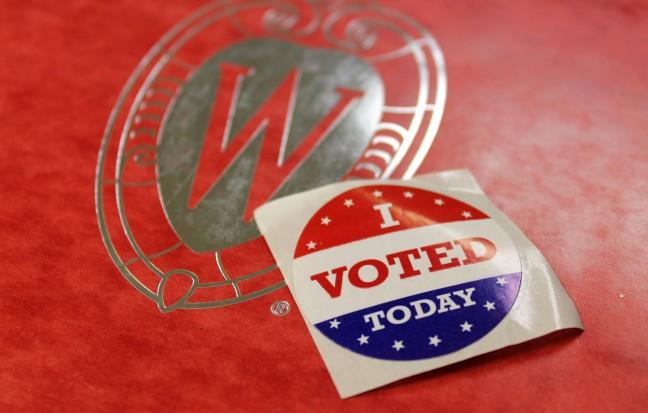Wisconsin held the most dramatic election in recent history this past Tuesday.
It was quite scary, by isolation standards, to see hundreds of people in masks and gloves spraying disinfectant and distancing themselves from each other in line. But what was even scarier was the people who came in without any regard for their safety or the safety of others amidst this pandemic.
Even toward the end of election day, the poll workers who had been wearing masks throughout the day had taken them off in their leisure, no doubt due to the growing comfort of being around people. It was terrifying to see people become so accustomed to the way we were living before and how easily they forgot the ramifications of being near one another in these trying times.
This is the reason why the election should not have occurred on Tuesday.
In the weeks preceding the election, Gov. Tony Evers was pleading with conservative legislators to administer absentee ballots to all registered voters across the state of Wisconsin. Conservatives, plagued with the fear of voter fraud, did not budge on their unwillingness to adapt to the given safety standards of a global pandemic.
As the clock ticked toward election day, Evers appeared to be doing everything he could in an attempt to protect the health and safety of his constituents. Monday, the day before election day, Evers issued an executive order postponing the election for two months so as to ensure the safety of his constituents.
But, was a strong conviction of heroism the real intent behind the executive order?
It is constitutionally mandated that the power of determining the time and place of elections is solely in the hands of state legislators, not to be interfered with by the executive branch. Such a fact is infamous for being considered the reason behind partisan gerrymandering.
In the Supreme Court case Arizona State Legislature v. Arizona Independent Redistricting Commission, the Supreme Court deliberated the constitutionality of an independent commission redrawing the district boundaries for congressional elections, state senate and state assembly elections due to the clear and indisputable fact that state legislatures hold the sole power in determining elections.
Though the case swung in favor of the liberals in a 5-4 decision, including the vote of Justice Anthony Kennedy who is no longer on the court, it is still widely criticized for not being constitutional, many critics from the conservative side. Many speculate that with the transformation of the court from a liberal majority to a conservative majority under the Trump administration, the Supreme Court may just overturn that case, not allowing independent commissions to redistrict in their states.
Evers absolutely knew this executive order trying to push the election back two months was, in fact, unconstitutional. And, though I think he had the safety of his constituents in mind when doing it, the executive order he issued was a blatantly political act to draw a distinction between himself and the Conservatives of the Wisconsin state government.
He knew full well the conservative-controlled Supreme Court was going to overturn his executive order, placing false hope in the hearts and minds of those hoping to stay home rather than working the election and those who are immunosuppressed and were hoping to cast their vote come election day.
This particular partisan act drew a divide between conservatives and liberals and only added to the chaos already in places like urban Milwaukee. Milwaukee, which typically has 180 polling places around the jurisdiction, operated with only five polling places yesterday. This caused overcrowding, hour-long waits in lines and ultimately a suppression of voters who chose to stay home in the face of these turbulent conditions.
Milwaukee is one of Wisconsin’s hub for Democratic voters and also one of Wisconsin’s hubs for the coronavirus. Forty percent of Wisconsin’s deaths have come from black people in Milwaukee, in a state that only has around 7% of a black population. Having an in-person election during this pandemic caused voter turnout to take a dive, continuing Wisconsin’s tradition of artificially crafting election outcomes.
No, Evers was not the only one to come out on top on Tuesday’s election day.
Wisconsin Supreme Court Justice Daniel Kelly was up for re-election Tuesday, and — seeing as more Democratic voters were suppressed — having the election Tuesday as opposed to postponing it two months like Evers intended, no doubt swung fewer votes in favor of his Democratic opponent, Jill Karofski. We won’t know the results of the election as absentee ballots will not be counted until April 13.
Historically, in an election cycle when conditions outside of their control disadvantage one candidate, such as an illness or family emergency, it is cordial for the opposing candidate to halt their own campaign events. What Kelly should have done was the lesser political act. He could have persuaded the Justices to delay the election per the state of emergency, not the executive order written by Evers. Not only does it still condemn the unconstitutional acts Evers committed, but it would have saved lives and ensured a fair election for the Supreme Court in which Kelly was running.
It is not hindsight showing us the election should not have happened.
No good came of holding the election Tuesday, and there is no doubt in my mind when I say there will be a grave increase in the number of cases and, inevitably, deaths in Wisconsin which will be directly related to the events that took place Tuesday.
Once again, I’m disgusted, yet unsurprised, by the way Wisconsin politics has come before the wellbeing of its constituents.
Kaitlin Kons (kkons@wisc.edu) is a sophomore studying political science and public policy.


